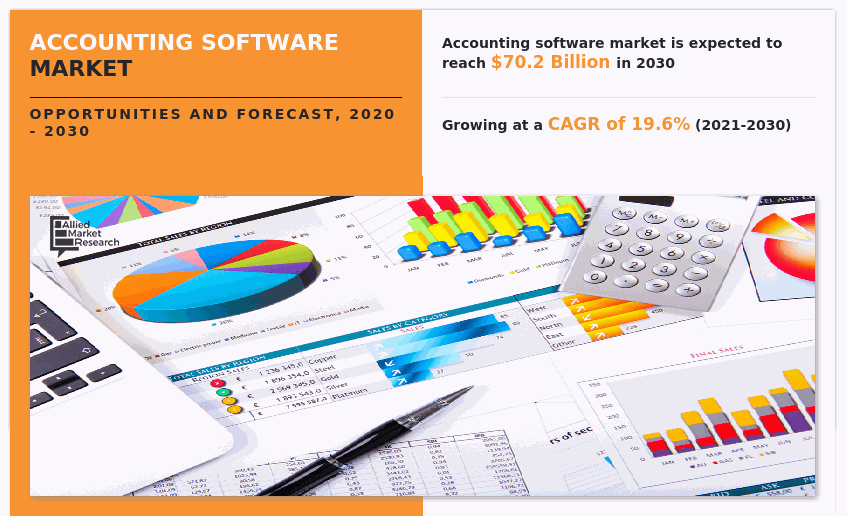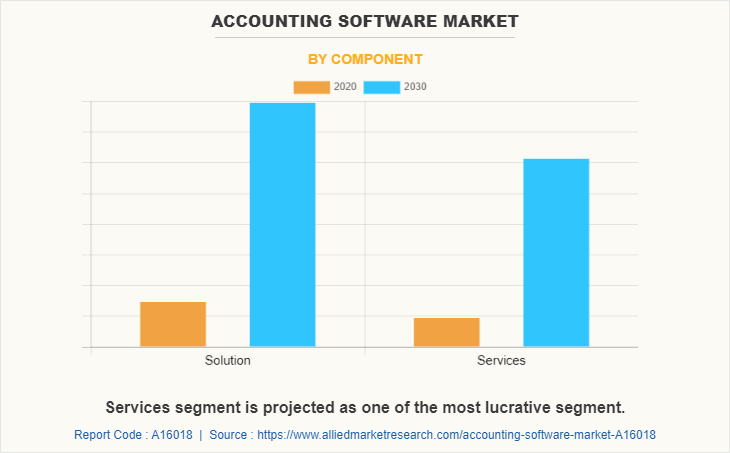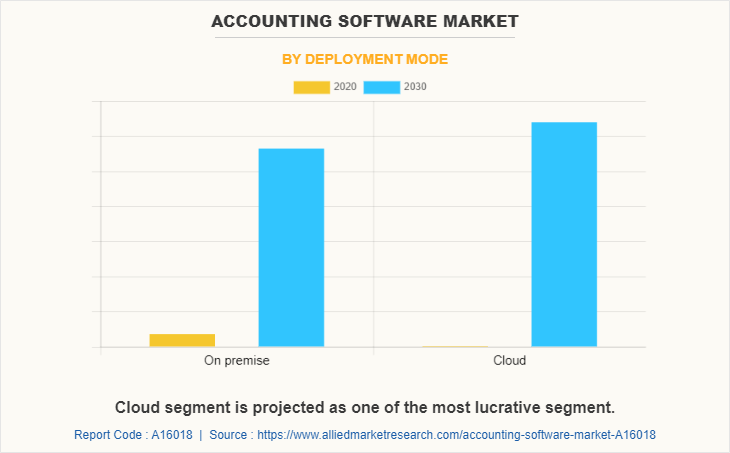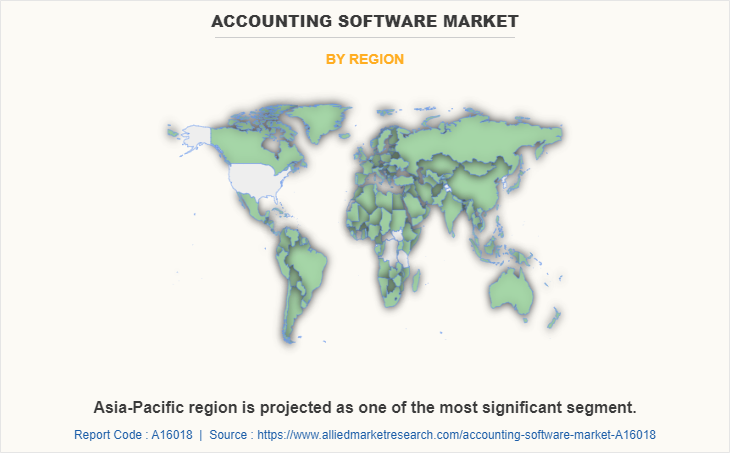Accounting Software Market Share & Size:
The global accounting software market was valued at USD 11.9 billion in 2020 and is projected to reach USD 70.2 billion by 2030, growing at a CAGR of 19.6% from 2021 to 2030.
Increase in adoption of innovative technology to increase business productivity and rise of virtual chief financial officer (CFO) to enhance business operation of small-scale to medium (SMEs) industry impact the growth of the market. In addition, increase in trend of automation in accounting process to enhance efficacy and eliminate manual task drives the growth of the market. Furthermore, the availability of advanced and robust IT infrastructure opens up numerous possibilities for accounting software.

In addition, increase adoption of mobile and app-based accounting software among enterprises and individuals is expected to provide lucrative growth opportunities for the accounting software market in the upcoming years. In addition, rise in investment for artificial intelligence (AI)-oriented accounting software is anticipated to provide numerous opportunities for the market growth. However, data security & privacy concerns and additional cost associated with accounting software hamper the market growth.
The accounting software provides a variety of advantages, including account receivable and payable, tax compliance, cash flow analysis, trial balance, balance sheet, invoicing, income & expanses statements, and payroll. In addition, it saves time & money and reduces the number of errors due to automation of process, which would provide the lucrative growth opportunities for the accounting softwaremarket. Furthermore, rise in investments in the industry such as BFSI, healthcare, retail, & e-commerce and increase in deployment of cloud-based accounting applications further propel the growth of the market.
On the basis of on component, the software segment dominated the accounting software market size in 2020, and is expected to continue this trend during the forecast period. The adoption of accounting software provides numerous benefits to the industry such as streamline the business process, eliminate the manual process, and reduce the time & cost, which further fuel the growth of the market.

However, the services segment is expected to exhibit the highest accounting software market share in the upcoming years. This is attributed to the fact that numerous benefits are associated with accounting services such as easy tax filing, cash flow analysis, trial balance, balance sheet, invoicing, income & expense statements, and payroll. In addition, these services enhance software implementation, maximize the value of existing installation by optimizing, and minimize the deployment cost & risks.
On the basis of deployment mode, the on-premise segment captured the largest accounting software market share in 2020, and is expected to continue this trend during the forecast period. This is attributed to numerous advantages offered by this on-premise deployment such as high level of data security and safety. Companies prefer on-premise model, owing to high data security and less data breach as compared to cloud-based deployment models, which further drives the demand for on-premise deployment model within the public and private sectors.

However, the cloud segment is expected to witness the highest growth in the upcoming years, owing to rise in adoption cloud-based accounting software, due to low cost and easier maintenance. In addition, it provides flexibility and scalability to boost business process, which propel the growth of the accounting software market.
On the basis of region, the North America region dominated the overall accounting software industry in 2020 and is expected to continue this trend during the forecast period. In North America, businesses are investing in their emerging technologies to streamline work processes. Moreover, due to the developed IT infrastructure in this region, cloud-based accounting software has seen widespread acceptance. Furthermore, increase in usage of accounting software in banking and finance to improve businesses and the customer experience, will provide lucrative growth opportunities for the market in this region.

The global accounting software market is segmented on the basis of component, by deployment mode, by type, organization size, industry vertical, and region. By component, the market is bifurcated into software and services. By deployment mode, it is segregated into cloud and on-premises. On the basis of type, it is fragmented into spreadsheets, commercial accounting software, enterprise accounting software, and custom accounting software. Depending on industry vertical, it is segregated into BFSI, retail & e-commerce, manufacturing, IT & telecom, healthcare, government & public sector, energy & utilities, media & entertainment, and others. By organization size, it is categorized into small to medium enterprise (SMEs) and large-scale enterprise. Region wise, it is analyzed across North America, Europe, Asia-Pacific, and LAMEA.
The report focuses on the growth prospects, restraints, and accounting software market analysis. The study uses Porter’s five forces analysis to understand the impact of various factors such as bargaining power of suppliers, competitive intensity of competitors, the threat of new entrants, the threat of substitutes, and bargaining power of buyers on the accounting software market trends.
Top Impacting Factors:
Rise Demand for Cloud-based Accounting Software
The demand for cloud-based accounting software is increasing for better security and real-updates. With the help of cloud-based accounting software, businesses can receive accounting-related services anytime, anywhere, on any device. In addition, it makes easier to collaborate and access all financial information from anywhere. Moreover, transparency and accountability in accounting services are now much easier to establish due to cloud technology. Furthermore, cloud-based accounting software provides flexibility and scalability in order to boost business operations. Thus, surge in demand for cloud-based accounting software notably contributes toward the accounting software market size growth.
Regional Insights:
The global market is growing rapidly as businesses across industries increasingly adopt digital solutions for managing financial operations, automating bookkeeping, and ensuring compliance with tax regulations. With the rise of cloud-based technologies and the increasing need for real-time financial data, accounting software is becoming a crucial tool for businesses of all sizes. Below are regional insights into the accounting software market:
North America
North America holds a significant share of the global market, driven by the high adoption of digital technologies and cloud computing by businesses across industries. The United States leads the region, with companies rapidly transitioning from traditional accounting methods to cloud-based solutions to streamline financial processes and improve operational efficiency. The presence of major accounting software providers, such as Intuit (QuickBooks), Oracle (NetSuite), and Microsoft Dynamics, has further strengthened the market in this region. Additionally, the growing number of small and medium-sized enterprises (SMEs) adopting these solutions to manage their finances and ensure compliance with ever-evolving tax regulations is contributing to the market's expansion. Canada is also seeing substantial growth, driven by a rising focus on digitization and financial automation among businesses.
Europe
Europe is another key region in the accounting software market, with countries such as the United Kingdom, Germany, and France leading the adoption of advanced accounting technologies. Businesses in Europe are increasingly turning to accounting software to manage complex financial tasks, comply with stringent regulatory requirements, and ensure accurate reporting. The introduction of regulations such as the General Data Protection Regulation (GDPR) and the Making Tax Digital (MTD) initiative in the UK has accelerated the adoption of digital accounting solutions, particularly cloud-based platforms that ensure compliance with these laws. European firms, particularly in the manufacturing, retail, and professional services sectors, are adopting accounting software to streamline financial operations and improve decision-making capabilities.
Asia-Pacific
The Asia-Pacific region is expected to witness the highest growth in the accounting software market, fueled by the increasing adoption of cloud-based solutions and digital transformation across industries. Countries like China, India, Japan, and Australia are at the forefront of this growth, with SMEs and large enterprises alike adopting accounting software to manage their finances more efficiently. In China, the rapid expansion of the e-commerce and retail sectors has driven the need for robust accounting tools to handle complex financial transactions and tax requirements. India’s rising number of startups and SMEs, along with the government’s push toward digitization through initiatives like Digital India and GST compliance, is further propelling the demand for accounting software. The growing trend of cloud adoption in Australia and Japan is also contributing to the market's expansion in the region.
Latin America
Latin America is experiencing steady growth in the accounting software market, with countries like Brazil, Mexico, and Argentina leading the way. The region’s growing focus on digitization and automation in the financial sector has spurred the demand for accounting software. Businesses in Latin America are increasingly recognizing the benefits of using accounting software to streamline tax compliance, improve financial reporting, and reduce errors. Brazil, with its complex tax system, has seen a rise in the adoption of cloud-based accounting solutions that help businesses manage tax-related processes efficiently. Similarly, Mexico’s focus on improving transparency and compliance with tax regulations is driving the demand for modern accounting software solutions.
Key Benefits for Stakeholders:
- This report provides a quantitative analysis of the market segments, current trends, estimations, and dynamics of the accounting software market analysis from 2020 to 2030 to identify the prevailing accounting software market opportunities.
- The market research is offered along with information related to key drivers, restraints, and opportunities.
- Porter's five forces analysis highlights the potency of buyers and suppliers to enable stakeholders make profit-oriented business decisions and strengthen their supplier-buyer network.
- In-depth analysis of the market segmentation assists to determine the prevailing market opportunities.
- Major countries in each region are mapped according to their revenue contribution to the global market.
- Market player positioning facilitates benchmarking and provides a clear understanding of the present position of the market players.
- The report includes the analysis of the regional as well as global accounting software market trends, key players, Accounting Software Industry segments, application areas, and market growth strategies.
Accounting Software Market Report Highlights
| Aspects | Details |
| By Component |
|
| By Deployment Mode |
|
| By Enterprise Size |
|
| By Type |
|
| By Industry Vertical |
|
| By Region |
|
| Key Market Players | Infor Inc., SAP SE, Xero Ltd, Sage Group Plc, Thomson Reuters, Intuit, Inc., Zeta Software LLC, Sage Group plc, Oracle Corporation, Zoho Corporation, Microsoft corporation |
Analyst Review
According to CXOs of the leading companies, over the time, enterprises have seen various changes in business processes, operations, and industrial automation. Moreover, accounting process are shifting towards the digitalization and increasing implementation of Industry 4.0 to cope with ongoing tough business competition, which creates the need for seamless solution and platform to meet the business requirements. This eventually boosts the adoption of accounting software in various sectors rapidly. The accounting software improves efficiency by keeping track of accounting activities and managing cash flow in or out of businesses. It has emerged as a better alternative for handling a business's finances, as it can handle account payables, business payroll, general ledger, account receivables, and other business modules easily.
Furthermore, accounting software is purchased by businesses to improve its their functionality and replace an outdated system. This is attributed to the fact that accounting calculations are time-consuming and difficult. On the other hand, accounting software can perform the calculations quickly and accurately without the need for human intervention, which drives the market growth. Moreover, automate manual processes boost the productivity and improve the enterprises data connectivity. This is why more system connections are being introduced by software suppliers to connect the accounting software to the rest of business systems, which is expected to provide the lucrative growth opportunities for the market during the forecast period.
Increase in adoption of innovative technology to increase business productivity and rise of virtual chief financial officer (CFO) to enhance business operation of small-scale to medium (SMEs) industry impact the growth of the market. In addition, increase in trend of automation in accounting process to enhance efficacy and eliminate manual task drives the growth of the market. Furthermore, the availability of advanced and robust IT infrastructure opens up numerous possibilities for accounting software. In addition, increase adoption of mobile and app-based accounting software among enterprises and individuals is expected to provide lucrative growth opportunities for the market in the upcoming years. In addition, rise in investment for artificial intelligence (AI)-oriented accounting software is anticipated to provide numerous opportunities for the market growth.
On the basis of region, the North America region dominated the overall accounting software industry in 2020 and is expected to continue this trend during the forecast period. In North America, businesses are investing in their emerging technologies to streamline work processes. Moreover, due to the developed IT infrastructure in this region, cloud-based accounting software has seen widespread acceptance. Furthermore, increase in usage of accounting software in banking and finance to improve businesses and the customer experience, will provide lucrative growth opportunities for the accounting software market in this region.
The global accounting software market was valued at $11,857.00 million in 2020, and is projected to reach $70,232.95 million by 2030, growing at a CAGR of 19.6% from 2021 to 2030.
This report gives an in-depth profile of some key market players in the accounting software market, include Infor Inc., Intuit, Inc., Microsoft Corporation, Oracle Corporation, Sage Group Plc., SAP SE, Thomson Reuters, Xero Ltd., Zeta Software LLC, and Zoho Corporation.
Loading Table Of Content...



